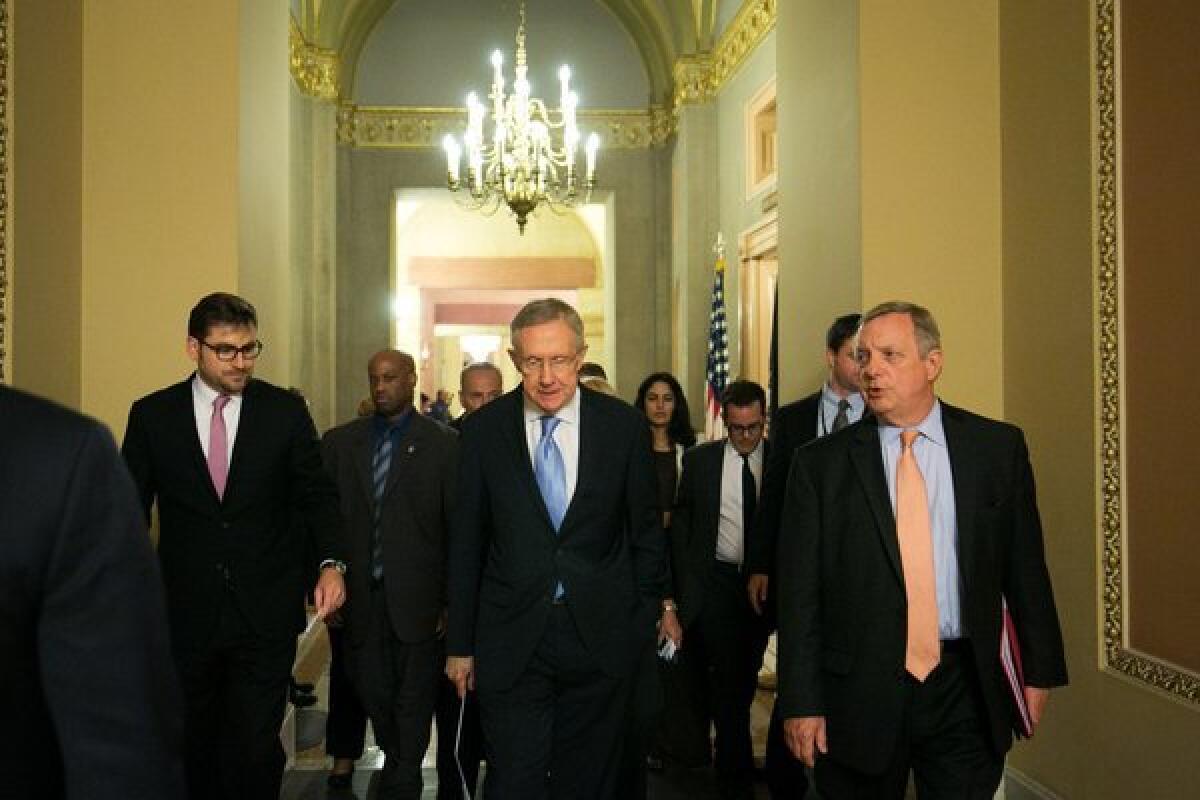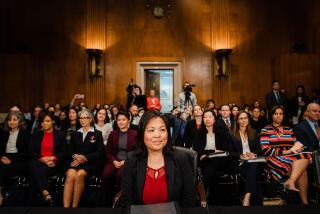Senate reaches tentative deal to end filibuster standoff

WASHINGTON -- Senators have reached a tentative agreement that will avoid a Democratic move to change Senate rules and eliminate the power of a minority to block action on executive branch nominations, Majority Leader Harry Reid announced Tuesday.
“It is a compromise. I think we get what we want and they get what they want. Not a bad deal,” Reid said in a brief speech on the Senate floor, shortly before the first of seven votes he had scheduled on long-delayed presidential nominations that were designed to force the issue.
The Nevada Democrat said there were still final details to be negotiated, but that he and his Republican counterpart would outline the proposal to senators at their weekly caucus lunches.
Senate officials said that under the tentative deal, the Senate would approve five nominees who have been stalled, including President Obama’s pick to head the Consumer Financial Protection Bureau, whom Republicans have blocked since last year. The list would also include Obama’s choices to head the Department of Labor and the Environmental Protection Agency.
PHOTOS: Team Obama, where are they now?
[Updated, 8:24 a.m. PDT July 16: According to Sen. John McCain, two nominees for the National Labor Relations Board would be dropped, but under the agreement, Obama would immediately name two new nominees who would be considered by the Senate under expedited procedures designed to have them in office by August.]
That move would allow Republicans to say they had not approved the two pending nominees, Richard Griffin and Sharon Block, whom Obama had named to the labor board during a Senate recess last year.
A federal appeals court later ruled those “recess appointments” exceeded Obama’s power under the Constitution, and Republicans have insisted since then that the two nominees were named to the board “illegally.”
Reid credited McCain with helping to resolve the impasse between the two parties, reprising a role the Arizona Republican played a decade ago when the GOP controlled the Senate and proposed changing the rules to block what it saw as obstruction by Democrats.
This time around, the Democrats are in the majority and have bridled at what they call unprecedented Republican obstruction of Obama’s choices to serve in executive branch positions, including the Cabinet. To end the delays, they had planned to push through a rules change that would have allowed a simple majority of 51 senators to end debate on a nomination instead of the 60 now required.
PHOTOS: 2013’s memorable political moments
That move would have been the biggest change in Senate rules in nearly four decades. Republicans opposed it, saying the change would fundamentally alter the chamber. Talks between Senate leaders had continued overnight and into the morning after a three-hour closed-door session of the full Senate Monday night failed to produce a compromise.
On Tuesday morning, Vice President Joe Biden, who was in the chamber to swear in Massachusetts’ new Democratic senator, Ed Markey, told reporters as he left the Capitol that “it looks like they may be working this out.”
“We’ll wait to see what the Senate does,” he said.
Follow Politics Now on Twitter and Facebook
Twitter/@mikememoli
More to Read
Get the L.A. Times Politics newsletter
Deeply reported insights into legislation, politics and policy from Sacramento, Washington and beyond. In your inbox three times per week.
You may occasionally receive promotional content from the Los Angeles Times.











